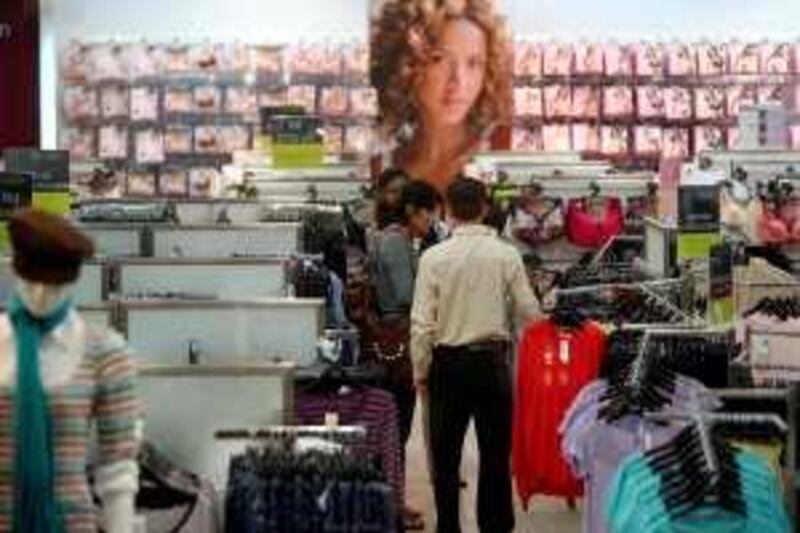PUNE, INDIA // "Gandhian methods don't always work," said Mahendra Shirole, pointing to a scar on his forehead. "Sometimes when people refuse to cough up cash, you have to flex your muscles." Mr Shirole, a tall, burly man in his late 20s, is no mafia extortionist. But by his own admission, his job is not that much different. He is a private money recovery agent - more commonly referred to here as a goon - who is hired by a large private bank to collect debts from credit card holders. Mr Shirole requested the bank not be named.
As India's economy boomed in recent years, millions of upwardly mobile Indians embraced consumerism - ignoring the warnings of frugal generations before them who balked at the idea of living off credit. Banks and credit card companies have leveraged this desire for the symbols of status, aggressively targeting India's 300 million-strong high-earning, high-spending middle class with a variety of high interest card offerings.
It seems to have worked. India now has 30 million credit card holders, triple the number half a decade ago. Over the past two years, the average credit card spending has jumped about 30 per cent, with debt in 2008 at US$14 billion (Dh51.4bn). But the recent economic slowdown has hobbled growth, exposing the middle class for the first time in many years to the dour prospects of job cuts, shrivelling salaries and rising debt.
Last year, defaults on credit card debt rose between 50 and 70 per cent, prompting banks to add more debt collectors such as Mr Shirole. Ankit Sharma, a private finance expert with Rupee Times, a personal finance web portal, does not blame the rising delinquency levels on reckless spending, but instead the avaricious interest rates charged by banks and credit card issuers. Most credit card companies charge interest rates of more than 40 per cent annually.
Complaints by credit card customers regarding overcharging and the issuance of unsolicited cards shot up by 74 per cent during 2008-09, according to the Banking Ombudsman, a body appointed by the Reserve Bank of India to look into the matter of increased complaints by customers. Credit card companies say they have no choice but to charge high interest rates because there is no collateral against defaulters, and the lethargic pace of court action is a deterrent to any legal challenge.
Last February, India's Supreme Court ruled that credit card companies could charge defaulters a hefty penal interest of up to 49 per cent, up from 30 per cent from the previous year. "Debt is a devil that tempts you to spend even on an empty pocket," said Ashish Khadsare, a property marketing executive, his fingers loaded with astrological rings. Mr Khadsare rues the day he applied for a personal loan. His father, a retired government employee, he says, had warned him against this "reckless western habit". But he paid no heed.
Two years ago, on his 25th birthday, an age at which his father, a conservative saver, could only dream of buying a car, Mr Khadsare became the proud owner of a pearl-silver Maruti Swift, a racy-looking midsized vehicle. Confident that a booming property market would guarantee a growing income, enough to easily pay off his 600,000 rupee (Dh47,500) purchase in instalments, Mr Khadsare took out a loan from a bank to finance his dream car at 14.5 per cent interest. But then the housing market slumped, and his salary decreased by a quarter.
"I keep paying off interest every month and the principal sum doesn't budge," he said. "It's not a good habit to purchase using plastic money. My father was right: only when you have real cash in your pocket should you spend." His wallet is full of credit cards, but he has maxed out every one. He faces the spectre of being chased by debt recovery agents like Mr Shirole if he does not pay up on time.
"Dreadful and atrocious, the recovery agents hired by banks are mostly goons and local criminals," Vaibhav Aggarwal, a loans markets expert at Rupee Times wrote in a recent column. "Firing expletives without any concern, these miscreants flaunt every rule in the book and can go to any limit just to get the money out of your pocket." Two years ago, two such collectors forced their way into the home of Renu Bhandwalker, a housewife, who had defaulted on her car loan. They confiscated her vehicle.
Mr Shirole, the debt collector, said recovering personal loans was easy in comparison to debt on credit cards. "If you don't pay for your car loan, I'll pinch your car," he said, taking a swig from a bottled drink at a local restaurant. "But recovering credit card dues - they are a major headache. You have to work hard to extract maximum payment." But he usually tries to recover payments by "nonviolent ways".
"But if they don't work, I don't have another option," he said. * The National





